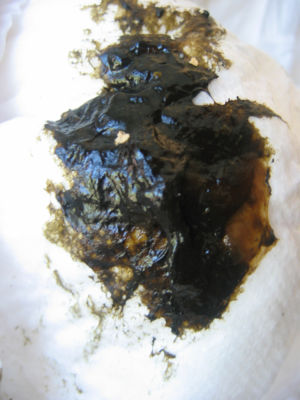Meconium ileus
| Meconium | |
|---|---|
 |
|
| Meconium from 12-hour-old newborn—the baby's third bowel movement. Scale: 5 cm left to right. | |
| Classification and external resources | |
| Specialty | Pediatrics |
Meconium is the earliest stool of a mammalian infant. Unlike later feces, meconium is composed of materials ingested during the time the infant spends in the uterus: intestinal epithelial cells, lanugo, mucus, amniotic fluid, bile, and water. Meconium, unlike later feces, is viscous and sticky like tar, its color usually being a very dark olive green; it is almost odorless. When diluted in amniotic fluid, it may appear in various shades of green, brown, or yellow. It should be completely passed by the end of the first few days after birth, with the stools progressing toward yellow (digested milk).
Meconium is normally retained in the infant's bowel until after birth, but sometimes it is expelled into the amniotic fluid (also called "amniotic liquor") prior to birth or during labor and delivery. The stained amniotic fluid (called "meconium liquor" or "meconium stained liquor") is recognised by medical staff that this may be a sign of fetal distress. Some post-dates pregnancies (where the woman is more than 40 weeks pregnant) may also have meconium stained liquor without fetal distress. Medical staff may aspirate the meconium from the nose and mouth of a newborn immediately after delivery in the event the baby shows signs of respiratory distress to decrease the risk of meconium aspiration syndrome.
Meconium had been thought to be sterile until the team of researchers from the University of Valencia in Spain found bacterial communities in it so developed that they seemed to fall into two categories. Around half of the samples appeared to be dominated by bacteria that produce lactic acid, such as lactobacillus, while the other half mostly contained a family of so-called enteric bacteria, such as Escherichia coli.
The Latin term meconium derives from the Greek μηκώνιον, mēkōnion, a diminutive of μήκων, mēkōn, i.e. poppy, in reference either to its tarry appearance that may resemble some raw opium preparations, or to Aristotle's belief that it induces sleep in the fetus.
...
Wikipedia
